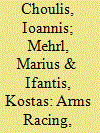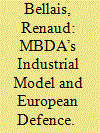|
|
|
Sort Order |
|
|
|
Items / Page
|
|
|
|
|
|
|
| Srl | Item |
| 1 |
ID:
187352


|
|
|
|
|
| Summary/Abstract |
Arms races are linked in the public conscience to potential violence. Following gas discoveries in eastern Mediterranean, Greece and Turkey nearly came to blows in August 2020 and both states have enacted military expansion plans, further risking escalation. We present a novel approach to study the effect of military build-ups on dispute intensity, using monthly data on Turkish incursions into Greek-claimed airspace. Because airspace claims feature strongly in the dispute, these contestations represent an appropriate measure of the intensity with which Turkey pursues the conflict. Theoretically, we suggest that bilateral factors drive this intensity. We argue that increased Greek military capabilities deter incursions whereas increased Turkish military capabilities fuel them. Results from time-series models support the second expectation. Consequently, the study provides a novel methodological approach to studying interstate conflict intensity and shines new light on escalation dynamics in the Greek-Turkish dispute.
|
|
|
|
|
|
|
|
|
|
|
|
|
|
|
|
| 2 |
ID:
187355


|
|
|
|
|
| Summary/Abstract |
Until today, the great majority of the relevant literature is dominated by growth models that assume common structural parameters and Total Factor Productivity (TFP) evolution across countries. In the context of the modified Solow convergence equation, the role of the present paper is to highlight the importance of incorporating cross–country differences, both in observables and unobservables, in the investigation of the defense–growth nexus. Special attention is paid to the heterogeneity in TFP growth and the cross–country dependence induced by global shocks. Furthermore, it analyzes the econometric issues involved by providing a brief review of various heterogeneous dynamic panel estimators. The presented estimators are then applied to two alternative panel specifications of the Solow model. Overall, the empirical application revealed that the Dynamic Common Correlated Effects (DCCE) estimator seems to be the most reliable option among the various dynamic panel estimators employed.
|
|
|
|
|
|
|
|
|
|
|
|
|
|
|
|
| 3 |
ID:
187351


|
|
|
|
|
| Summary/Abstract |
I use the synthetic control method to estimate the effect of international banking and energy sanctions from 2012 to 2015 on Iran’s military spending. I created a counterfactual Iran, a synthetic control group, that mimics the socioeconomic characteristics of Iran before the international sanctions of 2012. Then I compare the military spending of the counterfactual Iran without sanctions to the factual Iran with sanctions for the period of 2003–2015. Over the entire 2013–2015 period, per capita military spending was reduced by approximately 117 US$ per year on average. The main findings are robust to a series of tests, including placebo tests. Estimated confidence sets show that the decrease in Iran’s military spending after the 2012 sanctions is also statistically significant.
|
|
|
|
|
|
|
|
|
|
|
|
|
|
|
|
| 4 |
ID:
187354


|
|
|
|
|
| Summary/Abstract |
This paper analyzes the economic effects of military base downsizing and closures at the regional level, considering the case of the US military Air Base located at Lajes, in Terceira Island, Azores, Portugal. A Computable General Equilibrium Model is used as a tool to examine these effects, allowing potential sector details and the identification of distributional implications. The results suggest that when no mitigation policies are undertaken, the downsizing process has a small regional effect on GDP but a greater local effect on the island. Imports, as expected, tend to decrease in the cutback scenarios and to increase when specific mitigation policies are considered. The main export gainers are the primary sectors that become more competitive due to factor price decreases. The main export losers are some industrialized products and services. The results provide support for the implementation of mitigation policies, which should be reasonable in both their intensity and focus, since there is a risk associated with these policies. Replenishing the public budget and allowing expenditures according to the current government expenditure structure tends to crowd-out private initiatives, leading to an overall long-term negative effect on the economy.
|
|
|
|
|
|
|
|
|
|
|
|
|
|
|
|
| 5 |
ID:
187356


|
|
|
|
|
| Summary/Abstract |
This paper studies the impact of education on domestic terrorism in Asian countries from 1970 to 2018. A control function approach is utilized to address the endogeneity of education on terrorism. Generally speaking, results show that education promotes domestic terrorism in Asia. Negative binomial regressions with and without control function are run for other parts of world to examine whether the patterns in Asia hold worldwide. Other important determinants of domestic terrorism in Asia include regime type, ethnic fractionalization, linguistic fractionalization, religious fractionalization, GDP per capita, and trade openness. This paper contributes to the literature by 1) applying a control function approach to control for possible endogeneity of education on terrorism, 2) analyzing exclusively Asia, a region where terrorism has been increasing rapidly over the last decade, (3) and focusing on domestic terrorism.
|
|
|
|
|
|
|
|
|
|
|
|
|
|
|
|
| 6 |
ID:
187357


|
|
|
|
|
| Summary/Abstract |
Among European arms producers, MBDA represents the most advanced example of industrial integration and cross-border specialisation, thanks to a unique model of French–British centres of competence. However, it constitutes an exception inside the European defence technological and industrial base. It is therefore relevant to analyse why MBDA was able to achieve such consolidation process from fragmented competences of the European missile industry and to merge once competing companies despite the lack of a unique regulatory framework at the European level. This article presents the main features of MBDA today. It analyses the consolidation process in the European missile industry that created MBDA. It underlines how cooperative programmes provided a critical impulse in favour of industrial consolidation and the specialisation of MBDA sites across Europe. It explains how technological and industrial assets were reshuffled across European borders. It focuses on exports as a key dimension for MBDA’s model. Finally, it concludes by exploring the limits that result from the lack of a unified regulatory framework in Europe.
|
|
|
|
|
|
|
|
|
|
|
|
|
|
|
|
| 7 |
ID:
187353


|
|
|
|
|
| Summary/Abstract |
We allow for the possibility of revenge in attacker-defender conflicts under a variety of settings including, for example, when one of the players faces a no-win situation. In a two-player two-period conflict where revenge stems from the grievances of one of the parties to the original conflict, we show that the presence of revenge can influence the amount of effort devoted to the conflict and may in certain circumstances, exacerbate it. We also give conditions when the presence of revenge can deter an attack altogether.
|
|
|
|
|
|
|
|
|
|
|
|
|
|
|
|
|
|
|
|
|